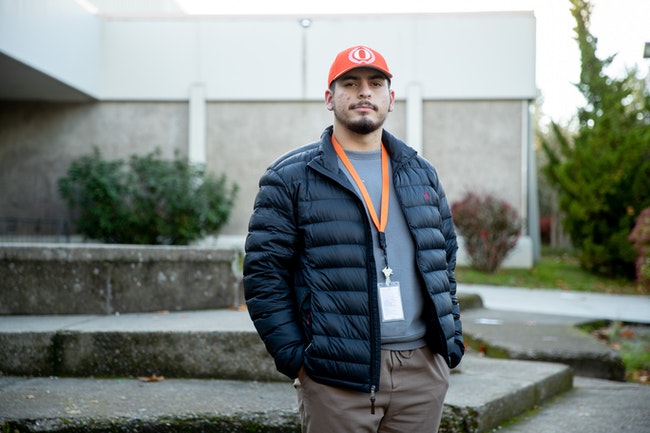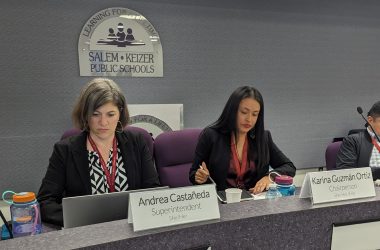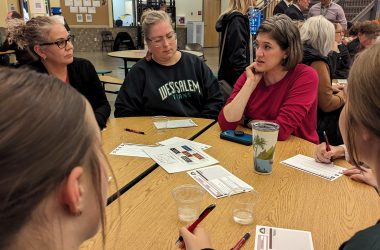
Juan Fernandez, community school outreach coordinator at Sprague High School, stands outside of the school on Friday, Nov. 5, 2021. (Amanda Loman/Salem Reporter)
When Juan Fernandez’s family moved to west Salem midway through school, the teen knew he wanted to stay enrolled at North Salem High School.
“They didn’t provide transportation. So I had to ride my bike five miles every morning,” Fernandez said of his commute to school.
Fernandez, who is originally from Mexico, said he didn’t start learning English until middle school and sometimes struggled to feel he belonged. But at North, he had teachers and adults who made him feel welcome – some because they spoke Spanish, and others because they offered a sympathetic ear.
He graduated in 2017.
Now, Fernandez hopes to help high school students feel the same sense of belonging he found at North. He’s working at Sprague High School as the community school outreach coordinator.
The job is one that’s existed for years in the Salem-Keizer School District but is new at Sprague.
Originally created to help migrant students, outreach coordinators are tasked with boosting student success by helping kids and their families with life circumstances that can get in the way of school.
That could mean working with a local church to organize a school supply drive or helping coordinate dental care so students don’t miss class because of untreated abscesses.
Historically, outreach coordinators in Salem mostly work at schools that receive extra federal money because they have a high share of students living in poverty. Many are bilingual in English and Spanish. About 40 district schools and programs have at least one such coordinator.
Sprague doesn’t fit the profile – just 27% of students in 2021 qualified for free school lunch, according to state data, the lowest share of any district high school. The measure is used as a rough indicator of family poverty rates.
“I’m aware of what people think. Sprague needing help, like what, really?” Fernandez said. He previously worked as a soccer coach at Sprague and said just because Sprague has more affluent students doesn’t mean the school doesn’t need help.
“Don’t judge a book by its cover. There is need everywhere,” he said.
Fernandez started his job this school year. His focus so far has been one-on-one meetings with students who are typically referred by the school’s counseling office because they may have unmet needs or don’t feel they’re part of the school community.
Fernandez’s role is a temporary position funded through Oregon’s High School Success Fund, established after a 2016 ballot measure to give high schools money for graduation improvement and dropout prevention programs.
District schools regularly survey students about their mental health and wellbeing, including whether they feel like they belong at school. In fall 2019, the most recent survey where a high share of students participated, just 35% of Sprague students reported they felt they belonged.
While that’s in line with other district high schools, which reported 31-37% belonging, Chad Barkes, Sprague’s principal, said it’s not good enough.
“Some of that’s just high school kids. Not everyone loves school. But there’s things you can do to try to get trusted adults in the students’ lives,” he said. He’d like to see the number go above 50%.
Barkes said Fernandez meets with students who have reported they don’t feel part of Sprague’s community. The two are also strategizing about ways to engage parents and the larger Sprague community for events.
“When we host open events and try to have families come onto our Sprague campus, we struggle,” Barkes said. The exception so far is the school’s information night about financial aid for college.
Fernandez said he hopes at first to build trust and make sure students understand he’s an adult they can ask for help. His charges include the roughly 10 Sprague students who are currently homeless or without stable housing.
Fernandez said recently, he had a student he’d met previously come to him because the student needed a new backpack their family couldn’t afford.
“I think that’s the impact we’re trying to make, making students aware that we’re here for them and seeing that students are comfortable enough to come reach out and makes me feel that we’re actually making a difference,” Fernandez said.
Contact reporter Rachel Alexander: [email protected] or 503-575-1241.
JUST THE FACTS, FOR SALEM – We report on your community with care and depth, fairness and accuracy. Get local news that matters to you. Subscribe to Salem Reporter starting at $5 a month. Click I want to subscribe!









